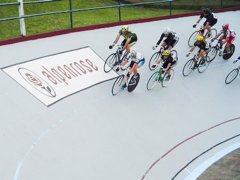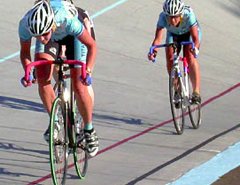
Track racers have been battling it out in Porltand’s southwest hills at the Alpenrose Velodrome Six Day Challenge this week.
The event is the official FIAC National Six Day Championships and the final day of competition is this Saturday.
The racers are dueling in a variety of events for their share at $5,000 in cash and prizes. Also at stake are bragging rights for what is thought to be one of the world’s first-ever women’s-only fields at a six day event.
OBRA’s Candi Murray says the Alpenrose Six Day has been running for 15 years and women started joining in only three years ago.
“At that time, they were in mixed teams, but we thought we could field a women’s only event this year, so we got FIAC to award a women’s only National Championship.”
Racers responded. Seven teams of women are competing — the same size as the men’s field. Murray says the women riders vary in age from 15 to 57.

Six Day racing involves a type of racing known as the “madison“, in which teams of two catapult each other around the track by joining hands and slinging their teammate forward. It’s intense and aggressive, says Six Day competitor Anita Dilles.
Dilles, and her partner Emily Charbonneau, have been competing all week. She says, “Having a women’s only field is a big deal, because madisons are typically a pretty intimidating race — even for men.”
A women’s only field isn’t just a big deal, it’s also very rare. Murray says a bit of research on Google turned up only two other women’s only fields at a six day event, “one in the 1890s and one in 1909.”
Dilles — who races for the Gentle Lovers team — says she’d love to see more ladies on the track, “The women’s track scene right now is fairly small, but it’s growing… it would be great to see more women racing track.”
This Sunday, Bike Central team rider Meg Mautner will host a Women’s Track Clinic at Alpenrose for anyone who’s interested in giving it a try.
If you’d like to see some of the action, head out to Alpenrose on Saturday:
- 2008 Alpenrose Six Day
FIAC Six Day National Championship
Alpenrose Velodrome (6149 SW Shattuck)
Racing starts at 6:00pm on Friday and 2:30 pm on Saturday







Thanks for reading.
BikePortland has served this community with independent community journalism since 2005. We rely on subscriptions from readers like you to survive. Your financial support is vital in keeping this valuable resource alive and well.
Please subscribe today to strengthen and expand our work.
just to add to the information – there were 2 women-only 6-days in 1895 or 1896 (one each in new york and london), and one mixed 6-day in new york in 1893. all three were of the pre-regulation style, where a single rider rode for 6 days straight – and the 1893 event resulted in a woman winning 3rd place *overall* (probably why they were later excluded, for the most part – women besting men at \”manly\” things, was, well, frowned upon 🙂 ) ive been unable to find any reference to a 1909 womens 6-day, though, and my source is a pretty definitive book on 6-day racing (roger de maerteleare\’s _zesdaagsen_, which lists results, or at least winners, for every six-day race from 1875-1991 – including the 1930 portland six, which is often forgotten) – which makes a women-only field all the more remarkable for not having occurred AT ALL for over a hundred years, and EVER in the history of 6-day racing as a team sport.
spectating is free! come out and watch 🙂
Dang, I wish my Saturday wasn\’t so full already. Track races are really fun to watch.
It was a great temperature on Friday night, but Saturday was hot! I took pictures on Saturday and was sweating doing that. Here\’s the best of what I got:
http://www.flickr.com/photos/bigbill25/sets/72157605875518785/
–Bill
To build upon what Joel started:
The Six Day race has indeed been around for over 100 years, in different formats.
I just finished the book Major Tayor, by Todd Balf. He first made his stake on the world as a racer in the Six Day race in Madison Square Garden in, I think, 1896. The book is about him being a baaaaad ass African American bike racer from the turn of the century. A remarkable story about racism and bike racing, and bike history.
Portlanders would like it.